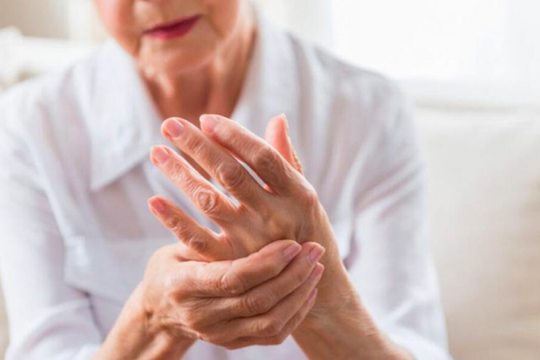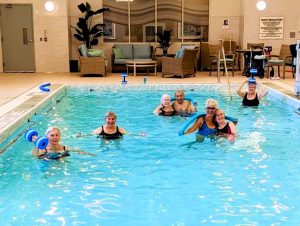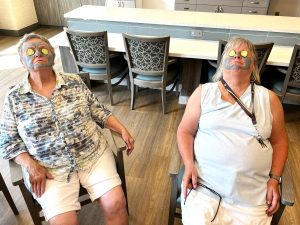
September marks both National Arthritis Awareness Month and International Pain Awareness Month — making it an important time for raising awareness and understanding about these silent conditions.
While arthritis affects about 20% of the Canadian population over the age of 15, the likelihood of experiencing the chronic pain of arthritis increases with age. Which is why it’s important to know that having arthritis doesn’t mean you have to miss out on doing the things you love. With the right support, planning, and interventions, it is more than possible for seniors with arthritis to stay active and healthy.
Tips to Help Older Adults Experiencing Arthritis Pain
 Arthritis means ‘joint inflammation’ and it affects almost one in five people in Canada.
Arthritis means ‘joint inflammation’ and it affects almost one in five people in Canada.
The most commonly affected joints tend to be in the hands, knees, hips and spine; however, it can develop anywhere in the body. Although symptoms of arthritis vary from person to person- and depending on the type of arthritis present-some of the most common symptoms include:
- Pain;
- Stiffness;
- Joints inflammation
- Difficulty moving a joint
Other than taking the medication prescribed by your doctor, is there anything that you can do to ease the pain? The answer is “yes”.
How to Cope With Chronic Pain
First things first: Make sure you’ve been following your doctor’s advice on pain management. Once that’s taken care of, look at how you can make lifestyle changes to help you cope with pain related to arthritis.
1. Stay Active
 If you have joint inflammation, it’s important to keep moving as much as you can. It might seem as though it could make your symptoms worse, but in reality, the worst thing you can do is sit still because joint health relies on movement.
If you have joint inflammation, it’s important to keep moving as much as you can. It might seem as though it could make your symptoms worse, but in reality, the worst thing you can do is sit still because joint health relies on movement.
Exercise is one of the most important treatments for arthritis. Exercise can:
- Reduce pain
- Help maintain the mobility of joints
- Strengthen muscles around your joints
- Contribute to a healthy body weight, which takes the pressure off joints
Exercise for seniors, in general, improves your overall health and fitness. However, activity should not be overly strenuous: Focus on low-impact exercises like yoga, swimming, aqua aerobics, and strength training.
Above all, don’t stop – adapt. Ask our expert activity and wellness staff about how you can modify your favourite exercises so that you can stay active and have fun! All our senior housing options in Canada offer opportunities for older adults to get up and get moving.
2. Follow a Healthy Diet to Manage Weight
 The best type of diet for any type of arthritis is a balanced diet that focuses on general health and healthy body weight. Being overweight will increase stress on joints, leading to increased pain and difficulty moving. Even losing a few extra kilograms can make a big difference.
The best type of diet for any type of arthritis is a balanced diet that focuses on general health and healthy body weight. Being overweight will increase stress on joints, leading to increased pain and difficulty moving. Even losing a few extra kilograms can make a big difference.
Eating the right foods can also help you get enough essential vitamins and minerals to improve your bone health and cartilage strength. Take a look at our superfoods for seniors to read about some good choices for your dinner plate.
The culinary teams at All Seniors Care Living Centres work hard to make sure that every meal is as nutritious as it is delicious. You can rest assured that you are getting a wholesome, balanced diet when you sign up for these daily dining services.
3. Protect Your Joints from Stress
Arthritic joints can’t tolerate as much stress as healthy ones. Pushing, pulling, or twisting motions can be painful.
As a general guideline, if pain persists for one hour after you do an activity, consider changing how you do it. Think about ways you can avoid unnecessarily stressing your joints. For example:
- Take rest breaks.
- Use adaptive tools.
- Alternate between sitting and stretching, and light and moderate activities, throughout the day.
- If you have pain in your feet, wear proper shoes. Ask your doctor or occupational therapist for specific recommendations.
Swimming, biking, and walking are all activities that are easy on the joints, and they get your body moving and your blood pumping. If you have access to a warm water pool, gentle movement in the pool is an ideal way to loosen stiff joints.
From stress on your joints to stress on your emotions, people with arthritis can benefit from learning to cope with stress in a positive way. Studies show that anxiety and poor emotional health can lower your pain threshold. The key to managing stress has three parts:
- Learn how to reduce stress.
- Learn how to accept what you can’t change.
- Learn how to overcome the harmful effects of stress.
At all our senior housing communities, we take stress seriously. Follow our Facebook page to see some the fun stress-busting activities happening in our residences.
4. Keep a Positive Attitude
 Many people with chronic arthritis pain find that a positive attitude can significantly boost their ability to cope. Do the things you enjoy — like a hobby or spending time with family and friends — to keep your spirits high. If you need additional support, seek out a therapist or ask your doctor about how hypnosis, meditation and breathing techniques can help you ease your pain. Read our Expert advice on how to stay calm, healthy, and active in retirement.
Many people with chronic arthritis pain find that a positive attitude can significantly boost their ability to cope. Do the things you enjoy — like a hobby or spending time with family and friends — to keep your spirits high. If you need additional support, seek out a therapist or ask your doctor about how hypnosis, meditation and breathing techniques can help you ease your pain. Read our Expert advice on how to stay calm, healthy, and active in retirement.
5. Hydrate
About 70-80% of your joint cartilage is made of water, so it comes as no surprise that a lack of hydration can make your joint pain worse. Dehydration can also be a hidden source of fatigue, headaches, confusion, and other symptoms.
Overall, when you’re well hydrated your body functions better, your joints feel better, and you have more energy. You may need at least 2 litres of fluids (eight 8-ounce glasses) a day, depending on your activity level and how hot and dry the weather is.
We know that water can get a bit boring. Try supplementing with tea or juice. Just be mindful that many juices contain a high amount of sugar – try mixing half and half with water to get the best of both worlds.
6. Maintain Good Sleep Habits
Research shows that pain, sleep, and inflammation are inextricably linked. A restful night’s sleep often starts with developing good sleep hygiene:
- Try to stick to a routine. Go to bed at the same time every single night.
- Get warm and comfortable bedding, blankets, pillows, and pyjamas.
- Keep your bedroom a little cooler than other rooms.
- Turn off your computer, cell phone, and television an hour before bedtime.
- Avoid caffeinated drinks and alcohol close to your bedtime.
For more tips on how to get a better night sleep, click here.
How Retirement Living Can Help You with Your Chronic Joint Pain
 Maintaining independence is essential to self-esteem. But there may be times when you’ll need assistance. Remember it’s okay to ask for help.
Maintaining independence is essential to self-esteem. But there may be times when you’ll need assistance. Remember it’s okay to ask for help.
While it may be hard to admit that some things are more difficult to do than before it is important to get help when you need it. This is especially true for activities that place a lot of stress on your joints. At All Seniors Care Living Centres, the caring staff are on hand to help make daily activities easier; from recreation to transportation and activities of daily living, we’ve got you covered.
Find out how a retirement residence can make living with arthritis easier. With independent and assisted living options in Alberta, Manitoba, Ontario, Saskatchewan, and Quebec, there’s one near you.
Links:
National Arthritis Awareness Month
#PrioritizePain
Writer – Julianna McLeod
Julianna is a health and wellness expert at All Seniors Care. Her mission is to create content that empowers seniors to form sustainable solutions for lasting health and happiness. She is an experienced writer, editor, and Recreational Therapist living in Toronto.